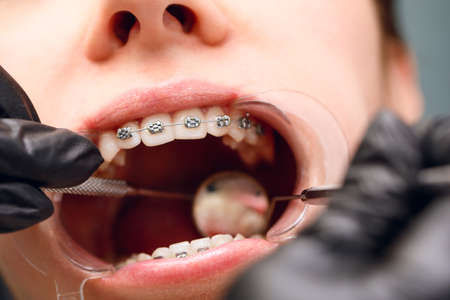The Ultimate Guide to Dental Braces in Dubai
- anayageorge275
- Jul 5, 2024
- 3 min read
Dental Braces Clinic in Dubai are a common orthodontic treatment used to correct various dental issues such as crooked teeth, overcrowded teeth, gaps, and bite problems. In Dubai, the demand for braces has increased significantly due to the growing awareness of dental health and the importance of a beautiful smile. This guide will provide a comprehensive overview of dental braces, their types, benefits, the treatment process, and what to expect when getting braces in Dubai.
Types of Dental Braces
Metal Braces: These are the traditional and most common type of braces. They are made of high-grade stainless steel and consist of metal brackets and wires. Metal braces are highly effective and can treat even the most severe dental issues. Modern metal braces are smaller and more comfortable than those in the past.
Ceramic Braces: Similar in shape and size to metal braces, ceramic braces use clear or tooth-colored brackets that blend with your teeth. They are less noticeable than metal braces, making them a popular choice for adults and teenagers who are concerned about aesthetics.
Lingual Braces: These braces are similar to traditional metal braces but are placed on the inside of the teeth, making them invisible from the outside. Lingual braces are customized to fit the shape of your teeth, providing a discreet option for those who need significant orthodontic work.
Invisalign: Invisalign consists of a series of clear, removable aligners that gradually move your teeth into the desired position. They are virtually invisible and can be removed for eating, brushing, and flossing, offering convenience and flexibility.
Benefits of Dental Braces
Improved Oral Health: Correcting dental issues such as crooked or crowded teeth can make it easier to clean your teeth properly, reducing the risk of cavities and gum disease.
Enhanced Appearance: A straight, beautiful smile can boost your confidence and self-esteem.
Better Functionality: Braces can correct bite problems, improving your ability to chew and speak properly.
Long-Term Results: The results of orthodontic treatment can last a lifetime with proper care and maintenance.

The Treatment Process
Initial Consultation: Your orthodontist will evaluate your teeth, take X-rays, and discuss your treatment options. This is a good time to ask any questions and understand the costs involved.
Treatment Plan: Based on the initial evaluation, a customized treatment plan will be created. This plan outlines the type of braces that will be used, the estimated duration of treatment, and the expected results.
Placement of Braces: During this appointment, the braces will be fitted to your teeth. This process can take one to two hours, depending on the type of braces.
Regular Adjustments: You will need to visit your orthodontist every 4-8 weeks for adjustments. These appointments are crucial to ensure that your teeth are moving as planned and to make any necessary changes to the braces.
Completion of Treatment: Once your teeth have moved into the desired position, the braces will be removed. Your orthodontist will provide a retainer to maintain the new position of your teeth and prevent them from shifting back.
What to Expect
Discomfort: It is normal to experience some discomfort after getting braces, especially during the first few days and after adjustments. Over-the-counter pain relievers can help manage this discomfort.
Dietary Changes: You will need to avoid hard, sticky, and chewy foods that can damage the braces. It is also essential to maintain good oral hygiene to prevent cavities and gum disease.
Regular Check-Ups: Consistent visits to your orthodontist are necessary to monitor progress and make adjustments.
FAQs about Dental Braces in Dubai:
Q1: How long does the treatment with braces take?
A: The duration of orthodontic treatment varies depending on the complexity of the case. On average, treatment can last from 18 months to 3 years.
Q2: Are braces painful?
A: You may experience some discomfort or soreness after getting braces and following adjustments, but this is generally manageable with over-the-counter pain relievers.
Q3: How often do I need to visit the orthodontist during treatment?
A: Regular visits every 4-8 weeks are necessary for adjustments and to monitor the progress of your treatment.
Q4: Can adults get braces?
A: Yes, braces are suitable for both children and adults. Many adults are opting for orthodontic treatment to improve their smiles and oral health.
Q5: What should I do if a bracket or wire breaks?
A: Contact your orthodontist as soon as possible to schedule an appointment for repair. Avoid attempting to fix it yourself to prevent further damage.


Comments